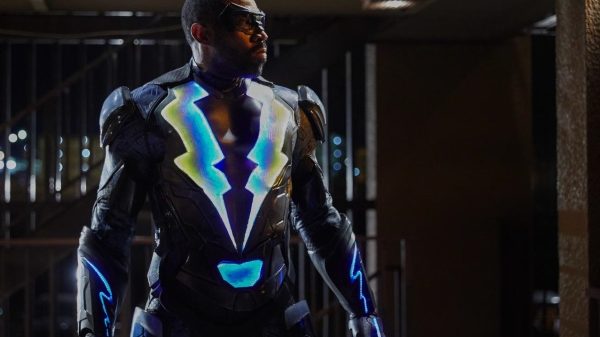We’ve been spoilt. Once upon a time the ideas of crossovers and characters switching between shows was a rarity, a treat in an otherwise static TV landscape. Sure, you had your franchises like Law & Order and its offshoots, and Angel would occasionally pop up in Sunnydale post spin-off, but it was nothing compared to what we have now.
Shared universes, both cinematic and televisual, have changed everything about the way we watch. Now it seems we can’t enjoy a property without wondering how it might connect with another.
You only have to look at the newscycle, which just today reported on potential crossovers between Krypton and the DC TV universe, and connections between Runaways and the upcoming Cloak and Dagger. It’s not enough to know properties come under the same umbrella – we want to see characters, worlds and stories interact, and interact on a regular basis.
Case in point – Black Lightning. A DC show run by Greg Berlanti et al, and airing on The CW, it’s understandable that audiences want it to intersect with Arrow, The Flash, Supergirl and Legends of Tomorrow. The trouble is, a couple of off-hand mentions aside, there’s been no evidence thus far.
Fans are confused at best, and resentful at worst. One problem is of course the perceived segregation of Black Lightning as the channel’s only black superhero, but that poses some logical issues too. Black Lightning is concerned with the crime in Freeland alone, and we have to suspend our disbelief that Barry and Oliver haven’t bothered to help him out.
That’s a continuous theme of most street-level superhero shows – the protagonists have to put their own oxygen masks on before they can hop on over to neighbouring crime hubs. Even Daredevil and Jessica Jones keep to their own sides of Hell’s Kitchen, and – budgetary issue aside – Avengers don’t tend to pop up on Agents of SHIELD.
Now, I’m someone who thoroughly enjoys the Berlanti-verse crossovers, whether that’s the ever-growing yearly extravaganza or the smaller ones that see Diggle visit Central City, or Kara jump through to Earth-1. That said, even I have to admit that the continuity for individual shows gets messy. Though I make it a point to keep up with all four series, those who don’t wish to are stuck seeing the big Barry/Iris wedding take place on Supergirl, and the eventual double wedding right at the end of Legends of Tomorrow.
Even the year before that, a huge, relationship-altering fight between Oliver and Felicity took place on The Flash, rather than Arrow where it maybe should have been.
Legends of Tomorrow is basically one big crossover show now, with long character histories for Sara, Ray, Firestorm, Mick and Snart all coming before the pilot episode. Then you have new additions like Wally, who first appeared on The Flash and is, himself, a speedster, and Constantine who, as someone who existed on a short-lived NBC series completely separate from these shows, is a whole other can of worms.
Black Lightning has so far proven to be a lot more focused in tone and character than any of its predecessors, and this is one big reason for keeping it away from the Arrow-verse for as long as possible. Viewers in the UK might not even notice the difference, with Black Lightning airing on Netflix rather than Sky One as the others do.
As tempting as it is to have one huge television universe in which any character can come and go as they please, it’s becoming a trend that’s in danger of shortchanging viewers who don’t have the time or energy to keep up with five shows a week. Not even Eastenders fans have to put up with that.
Leave Black Lightning in Freeland, he wouldn’t get along with Oliver Queen anyway.

